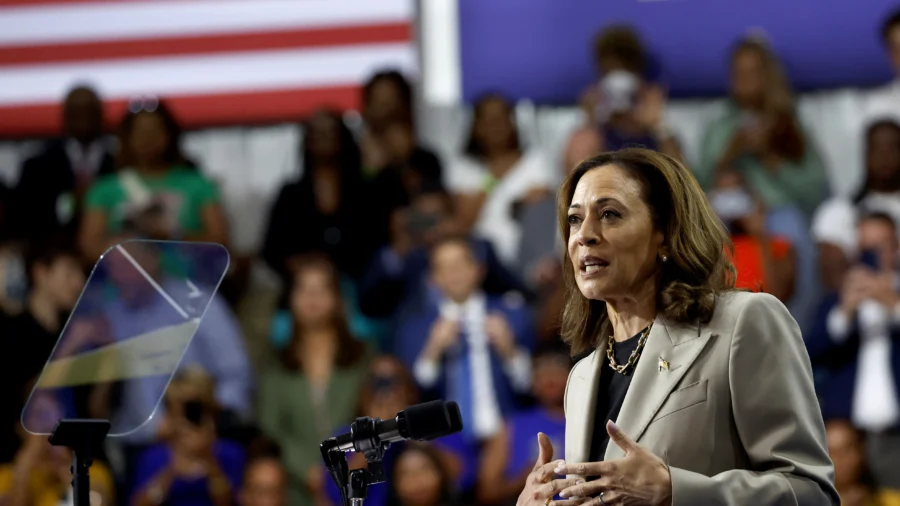Vice President and Democratic presidential nominee Kamala Harris is set to unveil her economic policy in North Carolina on Friday.
Harris’s economic agenda will focus on lowering the cost of groceries, housing, and health care, bolstering the child tax credit, and drawing a contrast with Republican presidential nominee former President Donald Trump on tariffs and taxes, aides and advisers said.
Harris plans to lay out some details of her economic plan in a speech in North Carolina on Friday that will touch on lowering costs and what she’s termed “price gouging.”
Inflation fell to below 3 percent for the first time in nearly 3.5 years in July, the Labor Department said on Wednesday, but high prices of groceries and consumer goods remain well above their pre-pandemic levels.
The economy remains a top concern for voters, who generally see Republicans as better economic stewards, according to polls.
Harris will call for a federal law banning corporations from setting excessive prices and call out the practices of meat processing companies, the Harris campaign said late on Wednesday.
Her proposal would allow the Federal Trade Commission (FTC) to investigate abuses and impose penalties in the food and grocery industry, while her administration would put more scrutiny on merger activity in the sector. Other Harris plans will deal with prescription drug costs and housing costs.
The FTC earlier this year said it was suing to block Kroger’s near $25 billion purchase of rival grocer Albertsons, which has drawn scrutiny over concerns it would reduce competition and drive grocery prices even higher.
The Harris campaign referred to the “ongoing challenge” to that merger in a statement describing her plans and said a Harris administration would aggressively investigate and prosecute price fixing.
In addition to consumer prices, Harris cares a lot about “pocketbook issues for working families, in particular those with small kids,” one Harris adviser told Reuters.
Earlier Thursday, President Joe Biden and Harris celebrated their efforts to cut prescription drug prices at an event in Maryland as she made her first joint speaking appearance with Biden since she replaced him at the top of the Democratic ticket nearly four weeks ago.
They announced that drug price negotiations will knock hundreds of dollars—in some cases thousands—off the list prices of 10 of Medicare’s most popular and costliest drugs. The program was created through the 2022 health care- and climate-focused Inflation Reduction Act. Harris’s Senate vote, as vice president, helped Democrats overcome unanimous GOP opposition to make the bill law.
“The tiebreaking vote of Kamala,” Biden told the audience, “made that possible.”
Harris’s economic platform closely mirrors that of Biden and aims to appeal to the middle class. Her campaign will pay special attention to what plays well with voters in battleground states, with less than 90 days from the presidential election, advisers said.
“Same values, different vision,” said one aide, describing how Harris’s economic agenda will be different from Biden’s. “She’s not moving far away from him on substance, she will highlight the ones that matter most to her.”
The Trump campaign has been mulling new tax cuts for middle-class households, and Trump proposed eliminating taxes on tipped wages—something Harris did as well in Las Vegas last week.
She was a champion of the child tax credit, which reduces the tax burden for lower-income families. “She’s going to embrace that,” the adviser said.
Progressive economic ideas often poll well with voters, but they have proven tough to pass into law. Most of Harris’s and Trump’s economic priorities need to go through Congress. A child tax credit bill passed the House but stalled in the Senate this year.
Not all elements of Harris’s economic agenda will make it to the Friday speech. Her campaign wants to avoid dividing voters and attracting attacks from business groups over granular details, and will be “strategically ambiguous” in areas like energy.
Harris no longer supports measures from her short-lived 2020 presidential bid such as a fracking ban, or Medicare for All, advisers said.
She will push plans to cut costs of rental housing and homeownership, including funding more affordable housing and building climate-resistant communities.
Harris, in her housing plan, wants to crack down on data-sharing and price-setting tools that landlords use to set rents, and to remove a tax incentive that has led investment firms to purchase wide swaths of the country’s housing stock. She intends to contrast her plan with Trump, who was sued by the Justice Department for housing discrimination five decades ago.
Harris will also draw contrasts with Trump on tax policy and tariffs, and maintain Biden’s promise not to raise taxes on people who make $400,000 or less a year, advisers said. Trump slashed the corporate tax rate to 21 percent from 35 percent and implemented other tax breaks that are set to expire next year.
Trump has promised to make the tax cuts permanent and suggested new across-the-board tariffs on imports, an idea Harris rejects. Trump’s campaign on Wednesday tied Harris to Biden’s economic record.
“America cannot afford another four years of Kamala’s failed economic policies. President Trump has a proven track record of making this country prosperous and affordable, and Americans can trust him to put more money back in their pockets again,” Trump spokesperson Karoline Leavitt said.
Trump also criticized Harris for being the tie-breaking vote to pass the American Rescue Plan Act in the U.S. Senate, a $1.9 trillion economic stimulus bill intended to bolster recovery from the pandemic, but has also been linked to inflationary increases.
Reuters and The Associated Press contributed to this report.

